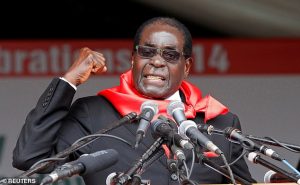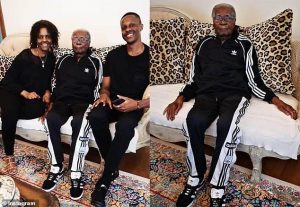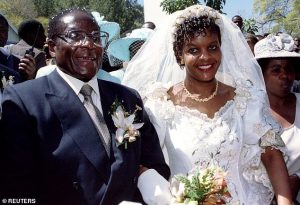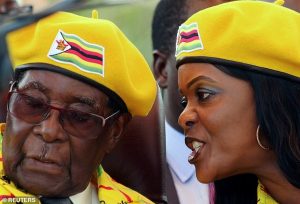Former Zimbabwean President Robert Mugabe, Dead At 95
Robert Mugabe, whose brutal rule of Zimbabwe turned his country into an international outcast and left it mired in corruption, violence and economic crisis, has died at the age of 95.
His death in Singapore, nearly two years after he was toppled from power, was confirmed this morning by current President Emmerson Mnangagwa. Reports in Zimbabwe say he died with his wife Grace at his side.
Mugabe had been in poor health, admitted to hospital in early April, apparently unable to walk and pictured looking extremely frail in photos alongside his son which may be the last ever taken of him.
Mnangagwa hailed Mugabe as an ‘icon of liberation and said his ‘contribution to the history of our nation and continent will never be forgotten’.
Mugabe was hailed by some fellow African leaders today, many of whom stood by him despite the brutality of his regime, but he will be little mourned by many of his countrymen who are now free to say so without fear of repression.
Mugabe came to power in 1980 as the founding leader of Zimbabwe, initially hailed as a liberator after the country became fully independent from British rule.

But his own reign was marked by murder, bloodshed, torture, persecution of political opponents, intimidation and vote-rigging on a grand scale and there was jubilation in the streets of Zimbabwe when he was toppled in 2017.
And under Mugabe’s leadership the economy of a mineral-rich country descended into chaos with thousands of people reduced to grinding poverty, many of them suffering from near-starvation and worse.

In what appear to have been the last photos of Mugabe, the former dictator was seen looking frail and weak alongside his favourite son in June.
Robert Jr, who spent much of his time with his father in his final months, shared photos of Mugabe looking slumped and shrivelled in a tracksuit, baseball cap and white beard.
The pictures are believed to have been taken in Singapore where Mugabe had been receiving treatment. Mugabe’s visible ailments were often shrouded in mystery. Officials often said he was being treated for a cataract, denying frequent private media reports that he had prostate cancer. Robert Junior had apparently been taping his father’s memoirs since Mugabe was ousted in 2017.
President of Zimbabwe Emmerson Mnangagwa amnnounced his his passing on Friday. He said:
‘It is with the utmost sadness that I announce the passing on of Zimbabwe’s founding father and former President… Robert Mugabe,’ said today.
‘Mugabe was an icon of liberation, a pan-Africanist who dedicated his life to the emancipation and empowerment of his people. His contribution to the history of our nation and continent will never be forgotten.’
It is with the utmost sadness that I announce the passing on of Zimbabwe’s founding father and former President, Cde Robert Mugabe (1/2)
— President of Zimbabwe (@edmnangagwa) September 6, 2019

Despite Zimbabwe’s decline during his rule, Mugabe remained defiant, railing against the West for what he called its neo-colonialist attitude.
He enjoyed some support among peers in Africa who chose not to judge him in the same way as Britain, the United States and other Western detractors.
Today the South African government hailed him as a ‘fearless pan-Africanist liberation fighter’ and offered condolences ‘to the people of Zimbabwe’.
Namibia’s President Hage Geingob also praised Mugabe, calling him ‘an extraordinary revolutionary and tenacious freedom fighter’.
Mugabe’s later years were partly overshadowed by the ambitions of his wife Grace, whom he married in 1996 and who aspired to be President herself.
The topic of his succession was virtually taboo during Mugabe’s decades-long rule but became unavoidable as he clung to power into his 90s and his health weakened.
The military finally intervened in late 2017 to ensure that Grace’s presidential ambitions were ended in favour of their own preferred candidate.
An embittered Mugabe resurfaced last year to say he was backing the opposition candidate at the 2018 election, refusing to support Mnangagwa and his own former ZANU-PF party.

Mugabe’s 40-year leadership of the former British colony was marked with bloodshed, persecution of political opponents and vote-rigging on a large scale.
Mugabe was born in Rhodesia – as the country was then-known – and co-founded the Zimbabwe African National Union (ZANU) in 1963, a resistance movement against British colonial rule.
He was jailed for anti-government comments between 1964 and 1974.
When his infant son died of malaria in Ghana in 1966, Mugabe was denied parole to attend the funeral, a decision by the government of white-minority leader Ian Smith that some experts say played a part in explaining Mugabe’s subsequent bitterness.
After his release, he rose to the top of the powerful Zimbabwe African National Liberation Army, known as the ‘thinking man’s guerrilla’ on account of his seven degrees.
He became prime minister in 1980 of the new Republic of Zimbabwe and assumed the role of president seven years later.
In 2000 he led a campaign to evict white farmers from their land, which was given to black Zimbabweans, and led to famine.
Zimbabwe was suspended from the Commonwealth in 2002 over accusations of human rights abuses and economic mismanagement and increasingly became an international outcast.
Spry in his impeccably tailored suits, Mugabe as leader maintained a schedule of events and international travel that defied his advancing age, though signs of weariness mounted toward the end.
Mugabe retained a strong grip on power, through controversial elections, until he was forced to resign in November 2017, at age 93.
In 1961, he married Sarah Francesca Hayfron. She died in 1992. Then in 1996, he married Grace Manufu, a union which produced two sons and one daughter. His first marriage produced one son who predeceased him.


